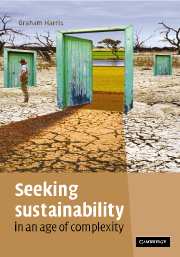Book contents
- Frontmatter
- Contents
- Acknowledgements
- 1 Preamble: the world we are in
- 2 Complexity and complex systems
- 3 New science, new tools, new challenges
- 4 The complexity of ecology
- 5 The generation of complexity
- 6 Micro-interactions and macro-constraints
- 7 A sense of place
- 8 Created landscapes and our changing sense of place
- 9 Catchment form and function
- 10 Catchment loads: ecosystem impacts
- 11 Change detection, monitoring and prediction
- 12 Evidence, uncertainty and risk
- 13 Modified landscapes: biodiversity
- 14 Function in fragmented landscapes
- 15 Environmental flows
- 16 Evidence for global change
- 17 Values and beliefs
- 18 Managing environmental, social and economic systems
- 19 Linking multiple capitals in a changing world
- 20 Community, capacity, collaboration and innovation
- 21 A new environmental paradigm
- 22 Emergent problems and emerging solutions: developing an ‘ecolophysics’?
- 23 Avoiding collapse
- Index
19 - Linking multiple capitals in a changing world
Published online by Cambridge University Press: 21 March 2011
- Frontmatter
- Contents
- Acknowledgements
- 1 Preamble: the world we are in
- 2 Complexity and complex systems
- 3 New science, new tools, new challenges
- 4 The complexity of ecology
- 5 The generation of complexity
- 6 Micro-interactions and macro-constraints
- 7 A sense of place
- 8 Created landscapes and our changing sense of place
- 9 Catchment form and function
- 10 Catchment loads: ecosystem impacts
- 11 Change detection, monitoring and prediction
- 12 Evidence, uncertainty and risk
- 13 Modified landscapes: biodiversity
- 14 Function in fragmented landscapes
- 15 Environmental flows
- 16 Evidence for global change
- 17 Values and beliefs
- 18 Managing environmental, social and economic systems
- 19 Linking multiple capitals in a changing world
- 20 Community, capacity, collaboration and innovation
- 21 A new environmental paradigm
- 22 Emergent problems and emerging solutions: developing an ‘ecolophysics’?
- 23 Avoiding collapse
- Index
Summary
Finding ways to understand and manage the interactions of the many forms of capital that together lead to sustainability.
The linkage of economic and ecological concepts and models requires us to be more realistic. Ecological systems are not linear, equilibrium systems; somehow we must find a way to link economic activity to the dynamics and resilience of natural systems. Deutsch and her collaborators wrote
We envision that the development of indicators of ecosystem performance to capture critical natural capital in the context of resilience will become an increasingly important area for both research and policy in the coming years.
Of course, there is a changing view that economies and societies are also non-equilibrium CAS and have similarly dynamic properties – so the challenge is to find ways to link the environmental–socioeconomic systems-of-systems. Science will play a role in this linkage as a generator of new knowledge, but it must do so in a much more engaged and interactive form and with the recognition of complexity. Whatever form sustainability science takes, a form of ‘postnormal’ science will be involved. Orthodox economics assumes at least short-term equilibrium and the applicability of concepts of marginal utility and essentially instrumental values. Economic models assume ‘well-behaved’ linear dynamics around equilibria. We are going to need a heterodox economics and a set of governance arrangements that does not use outdated physics-based assumptions.
Information
- Type
- Chapter
- Information
- Seeking Sustainability in an Age of Complexity , pp. 264 - 279Publisher: Cambridge University PressPrint publication year: 2007
